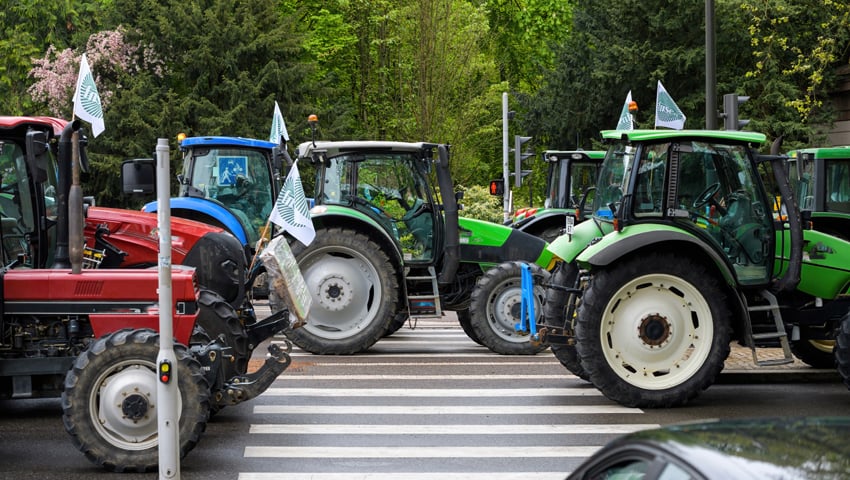In this article we feature commentary from two organisations concerned by the power dynamics behind recent European farming protests.
Lighthouse Reports
Lighthouse Reports says that “Angry farmers have seized the political agenda across Europe”, but asks, “how many of their actual demands have reached the negotiating table?”
They say that while there is a widespread agreement that European farmers are struggling, the solution to their woes is hotly debated.
Demands for fairer prices, more supportive policies and less bureaucracy have frequently been presented as a rebellion against green regulations – and these issues have become a political battleground in this week’s European elections.
Lighthouse Reports – which pioneers collaborative journalism and public interest investigations – wanted to know more about the powerful forces shaping the farmer protests.
They have completed an investigation into some of the key figures claiming to represent farmers at recent protests in France, Italy, Germany and Poland.
They gathered testimony and scoured through company records to build profiles of some of the most influential figures framing the meaning of the protests.
In a series of investigations they show that the representation of European farmers is concentrated in the hands of a few people who bear little resemblance to the average farmer they claim to speak for. They are much wealthier, sit on the boards of multiple companies and have close links with ‘Big Ag’ companies whose interests can be opposed to those of farmers.
Find out more about the Lighthouse Reports investigation here
Corporate European Observatory
Meanwhile, the Corporate European Observatory (CEO) has also broadcast its concern. The following article is written by the CEO press office.
This week, – writes the Corporate European Observatory – a farmers protest took place in Brussels.
Previous protests were a reaction to the lack of fair income and livelihood security for farmers. In the middle of a cost of living crisis created by high prices and high inflation, incomes in agriculture have fallen to 47% of average gross wages in the EU. In the last 15 years, over 5 million farms have disappeared in the EU, and this trend continues.
But instead of taking measures for a fair income, EU Commission President Ursula Von Der Leyen, backed by her EPP group, chose a derailment of the EU’s green agenda as a way to respond.
This is precisely what the lobby campaign led by agribusiness lobbyists from Copa-Cogeca and its members and pesticide industry lobby group Croplife Europe aimed to achieve.
Far-right parties are now trying to cash in on farmers’ anger. Earlier this year, far-right think tanks such as Hungarian Government-funded MCC Brussels aimed to frame the protests into a right-wing narrative focussed solely on attacking the EU Green Deal and any environmental or health protection.
Nina Holland, researcher and campaigner at CEO, said, “The protest speakers’ list is dominated by far-right or ultra-nationalist parties. In countries where the far right is already in power, such as Hungary or Italy, they are failing farmers with the same bad policies that serve neither farmers nor the environment.”
For example, speaker Lola Guzmán from Spain is an ex-Vox militant and big landowner that leads the Spanish Plataforma 6F. The extreme-right party, Vox, while presenting itself as anti-globalist and defender of small farmers, works closely with extreme pro-free trade think tanks. These advocate against any health or environmental measures, and for a completely liberalised agricultural market.
Vox also runs various regional agricultural ministries in Spain, yet opportunistically supported the farmers protests, whilst continuing the same policies from previous governments.
Wybren van Haga heads the Dutch ultranationalist party Belang van Nederland with an election programme that calls for the Netherlands to leave the Paris Climate Agreement, and for an end to EU bans on pesticides. This while farmers are the first to suffer the consequences of the climate crisis, as well as the health risks from using pesticides.
Tom Vandendriessche, Belgian MEP from the flemish far-right party Vlaams Belang, has a poor voting record for supporting farmers. At the last CAP-reform, he voted against many proposals that could have helped farmers: against promoting local supply chains, against unfair trading practices by supermarkets, against support to farmers to reduce pesticides, and even against measures to combat fraud with farm subsidies by corporations.
The nationalist MEP Rob Roos has also voted against measures to reduce pesticides. He even voted against an amendment aiming to share the responsibility for pesticide reduction fairly among the food chain. This means that supermarkets would have to do their bit, instead of just the farmers.
Last month’s summit of far-right parties held in Madrid, convened by Vox, was a clear demonstration how far-right parties claim to be ‘anti-globalist’ but in reality collaborate closely with ultra-free trade think tanks.
At the event, Vox leader Abascal appeared alongside Robert Severino of the Heritage Foundation (part of Atlas Network of think-tanks) which helped shaped global free trade agenda and corporate globalisation.
Another member of the Atlas Network, ECIPE, is strongly defending free trade agreements including EU-Mercosur. One of its former employees, Emily Rees, is now Director of Croplife International, the global branch of the pesticide industry lobby.
Both the EPP and far-right parties are trying to gain the ‘rural vote’, but neither will really protect the livelihoods and well-being of most farmers.
The opportunistic dismantling of the European Green Deal was a step back that needs to be overcome, with politics that defend all communities and the environment, creating true alternatives for the future.
João Camargo, campaigner and researcher at CEO said, “The situation that lead to these protests has not passed and will aggravate in the upcoming years. The highly intensive agricultural model is simply impossible to maintain. The social and environmental crisis we are currently in will demand a true response.”
